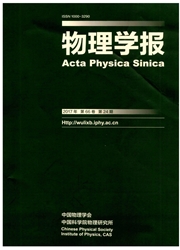

 中文摘要:
中文摘要:
4H-SiC晶体经能量为100keV,剂量为3×1016cm-2的氦离子高温(500K)注入后,再在773—1273K温度范围内进行了退火处理,最后使用纳米压痕仪测量了样品注入面的硬度.测试结果表明,在500—1273K温度范围内样品的硬度随退火温度升高呈现先增大后减小再增大的趋势,其中773K退火样品的硬度增大明显.分析认为,退火样品的硬度变化是由退火过程中缺陷复合与氦泡生长导致样品内部的Si—C键密度、键长和键角改变引起的.
 英文摘要:
英文摘要:
The hardness of 4H-SiC,which was high-temperature (500 K) helium-implanted to fluences of 3 × 1016 ions cm-2 and subsequently thermally annealed at the temperature ranging from 773 to 1273 K,was studied by nanoindentation. It is found that the hardness of the implanted 4H-SiC increases at the first,then decreases,and then increases again with increasing annealing tempeature in the temperature range of 500—1273 K,and significant increase in hardness is observed at 773 K. The behavior is ascribed to the changes of the density,length,and tangling of the covalent Si—C bond through the recombination of point defects,clustering of He-vacancy,and growth of helium bubbles during the thermal annealing.
 同期刊论文项目
同期刊论文项目
 同项目期刊论文
同项目期刊论文
 Optical properties of annealing behavior of high-temperature He-implantion induced defects in silico
Optical properties of annealing behavior of high-temperature He-implantion induced defects in silico 期刊信息
期刊信息
